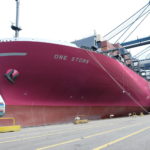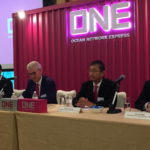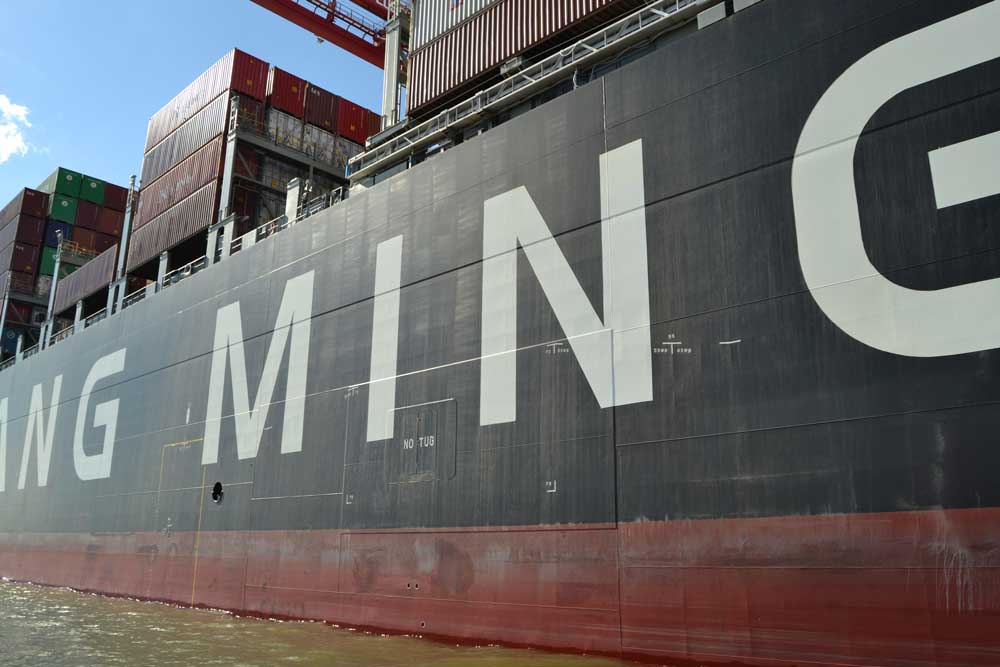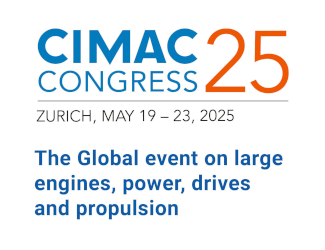Newly formed liner company Ocean Network Express (ONE) celebrated its official launch with a party in Singapore that was attended by more than 500 people. The »Hybrid« model has been highlighted, reports Judith Tan
As ONE, we can. This corporate slogan launched Ocean Network Express or ONE in Singapore on June 28 as the[ds_preview] company set sail in a blaze of pink branding. »ONE is a completely new company born out of the legacy of three great Japanese shipping companies, which collectively have over 300 years of maritime experience. … And as we say in ONE, we want to be a company that is big enough to survive but small enough to care,« its Chief Executive Officer Jeremy Nixon told over 500 guests at the launch of its Singapore headquarters, held at the Grand Copthorne Waterfront Hotel.
ONE is a combination of Japan’s »Big Three« shipping lines, Kawasaki Kisen Kaisha (»K« Line), Mitsui OSK Lines (MOL) and Nippon Yusen Kabushiki Kaisha (NYK Line) and is inspired by the vision to better meet customers’ needs with high-quality, competitive services and an innovative business approach.
The launch reception coincided with the maiden call in Singapore earlier in the week by the »ONE Stork« 14,000 teu newbuilding, the first to bear the new company›s distinctive magenta branding. ONE had started operations nearly three months ago on April 1 (2018).
At a press conference held earlier, Nixon said ONE has been positioned »around the middle of the pack«. »We are not positioned in the top three or four but you could say we are somewhere between five and six, which gives us a lot more scale and momentum to ride out the uncertainties and challenges of global shipping,« he said. Nixon also added that ONE fills »the gap between the mega-carriers and the niche carriers«. »We try to fill the gap as a hybrid carrier with a different strategy. So global service, global coverage, good scale, but one single brand for the customer so we can look after all of them in 120 countries in the world, but particular strong focus on service delivery,« he said.
All eyes have been on this new joint venture since April, when ONE began operating from its new global headquarters in downtown Singapore, and ONE is set to add significant shine to the shipping industry in Singapore. The city-state’s homegrown mainline operator, Neptune Orient Lines (NOL), sold its liner operations, APL, to French line CMA CGM in September 2016.
ONE’s formation was announced in October 2016, as weak earnings, excessive competition and the need for scale economies in liner shipping drove consolidation.
»At the moment, we are focused entirely on the integration of ONE. That is our key project and therefore we have no further plans at the moment. In any event, we have to be efficient in working with the market,« Nixon said.
»There are many players in the industry and there has to be some sort of compromise between regulators and the quality of service to the customers and, of course, the shareholders,« he added.
Nixon said it is true that the trading markets are challenging at the moment. Weak retail sales worldwide and the US-China trade war have created uncertainties.
»At the end of the day, when you are deploying services or loops, many of us are operating on the same level of economies. We have the same ship types, the same fuel prices, and we face the same seasonality. So it is not just about scale and administration costs, it is also about the operational costs. At the moment, in some trades, the freight rates are quite challenging when you look at the individual carrier’s operational costs,« he said.
»But with regards to ONE, we do have more scale than the three historical legacy companies individually and we want to be able to use that scale as effectively as we can in those markets where we didn’t have the economies of scale before. It will be useful but there is no guarantee for any carrier they will not suffer from some quite difficult trading conditions,« he added.
Nixon also admitted at the briefing that at the start in April, ONE did face some challenges, in terms of its »ability to absorb the level of business with the resources we have«.
»But the staff globally worked well and strongly to overcome this and by June, we were able to catch up. We are just closing our first quarter now and we stabilized the operation in terms of network and systems, and staff. Our utilization also came back up to industry standards so we are looking forward to the next quarter and the remainder of the year with confidence,« he said.
Judith Tan


















